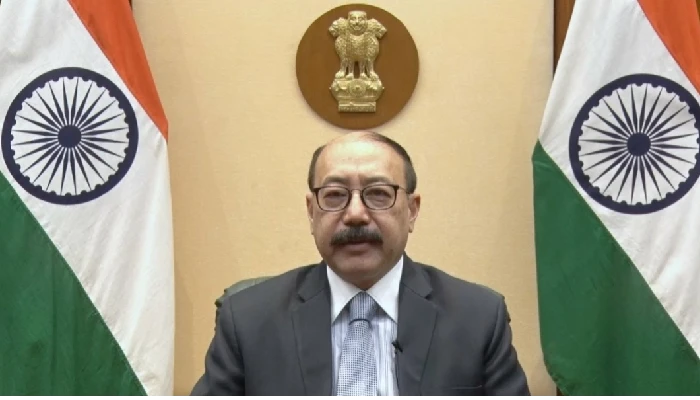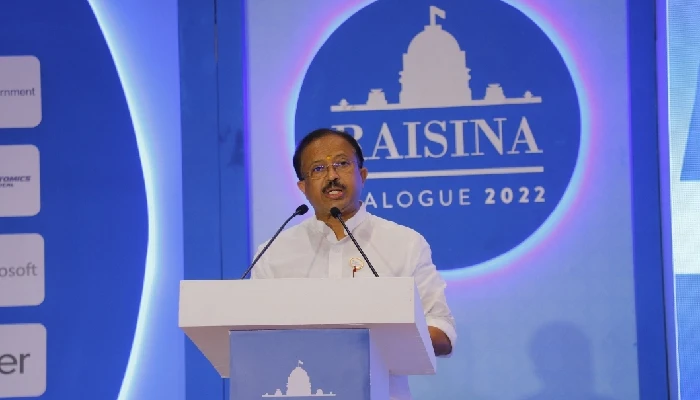Considerable turbulence is currently underway in many parts of the globe, he said
Noting that India’s role in the changing international order will be shaped by its own circumstances, Foreign Secretary Harsh Vardhan Shringla has said that India is reaching out to the world, to provide long-term solutions for global peace, security and prosperity.
In his remarks at the Inaugural Dinner of the Raisina Dialogue 2022 in New Delhi on Monday, Foreign Secretary Shringla said “A lot has evolved in this region in the last year. Considerable turbulence is currently underway in many parts of the globe. The future is being shaped as we meet here today.”
“Friends, when the pandemic struck us, the global order was already edging towards an era of disruption, competition, undermining of rules, and questioning of regimes. As we gather today, the global strategic outlook appears even more uncertain and complex,” Shringla said.
"Let me highlight some of the overarching trends, he said, post the peak of the pandemic, States are grappling with three overarching ideas: self-reliance; the stability and security of supply chains; and the right balance between geopolitics and economic imperatives," he said.
“With the limitations of the old system, trading nations seek like-minded actors to create networks built on trust, and infrastructure that prioritizes resilience and quality,” the Foreign Secretary added.
“Data, digitisation and technology are reshaping and redefining almost every aspect of business and society today. South Asia and the Indo-Pacific region find themselves in a unique position in this rapidly evolving global economic world order,” he observed.
“We are driven by a rising consumer class, strong start-up ecosystem, growing internet economy and a robust demographic dividend. This opportunity must be explored – to build trade and digital connectivity projects that cater to our aspirational population,” Shringla said.
Stating that climate action is becoming the defining phrase of our generation, he said, together, key nations need to start investing in institutional frameworks that support the new energy landscape of the future.
“To that effect, the International Solar Alliance, of which India is a founding member, can be the pivot of a new era of coalitions for like-minded nations,” India’s top diplomat stated.
“While we are dwelling on this topic, I must point out that if shared visions of a common future, our climate targets included, are to be achieved, then the Global North has to deliver on its green finance commitments,” he urged.
“Today, the actual flow of capital to developing countries remains well below stated pledges and real requirements. We ought to think how geopolitics can serve energy transitions, instead of complicating it,” Shringla maintained.
“There are many divisive issues across the globe today, emerging new threats, and equally large economic dependencies in our interconnected world. How does one really navigate through this maze of geopolitical contestations?,” he asked.
According to the Foreign Secretary, a trend that suggests a return of great power competition on the world stage is rising defence budgets. It has led to increasingly assertive defence postures in many geographies. Students of History amongst us will know how significant a change this is.
Arguing that tectonic shifts in our own region have come with implications, he stated that the situation in Afghanistan has catalysed the humanitarian and developmental challenges in that country. Farther away from home, the situation in Ukraine has been of deep concern.
“Our position has been steadfast and consistent. We seek immediate cessation of violence. We call for ending the crisis through talks,” Shringla asserted.
“Today, we see harsh outcomes of debt-trap diplomacy and unsustainable financing models that undermine the idea of traditional regional cooperation. We have noticed the damaging impact such models can have on a country, on its peoples,” he said.
“And as a responsible power, we continue to stand with our friends and partners to help them in these testing times,” the top Indian diplomat further stated.
“As we progress in our conversations over the next two days, we need to think about how these trends affect the region and impact its geopolitical options and choices. That brings me to the wider question on the future of multilateralism as we know it,” he revealed.
“Friends, the only way to solve a problem is to first acknowledge that there is a problem,” Shringla stated.
“To every person in this room, it is probably clear by now that the existing multilateral institutions have demonstrated incapacity in one way or the other when it was meant to deliver. And as such, reforms at its core cannot be held up any longer,” he added.
“India at 75 has evolved as a significant global actor with commensurate expectations from the world regarding its choices, actions and its dynamic evolution,” the Foreign Secretary mentioned.
“From responding to climate change, pandemics and humanitarian crises, to global peace and security, to technology and digital frontiers, India’s actions will shape the 21st century world. We shall continue to remain focused on an inclusive and human-centric development,” he argued.
“As we take stock of some of these key meta-issues that will shape our future, and work our way through the rebalancing of the world order, we need to begin by asking ourselves – are we future-ready?” Shringla asked.
“The last few weeks have demonstrated that as a standalone and strategically autonomous power, India will act in accordance with its national interests. Strategic autonomy is not the same as a rigid, isolationist, ideological aversion to partnerships and alignments,” he mentioned.
“Our role in the changing international order will be shaped by our own circumstances, and the cumulative consciousness of our culture, history and ethics,” India’s top diplomat said.
“It is reflective of a confident, sharp eyed understanding of our strategic interests. We believe that this is our 21st century approach towards foreign policy,” he added.
“And with that, this is India reaching out to the world, to jointly seek and provide long-term solutions for regional and global peace, security, and prosperity,” the Foreign Secretary professed.
 Contact Us
Contact Us  Subscribe Us
Subscribe Us









 Contact Us
Contact Us
 Subscribe
Subscribe
 News Letter
News Letter

